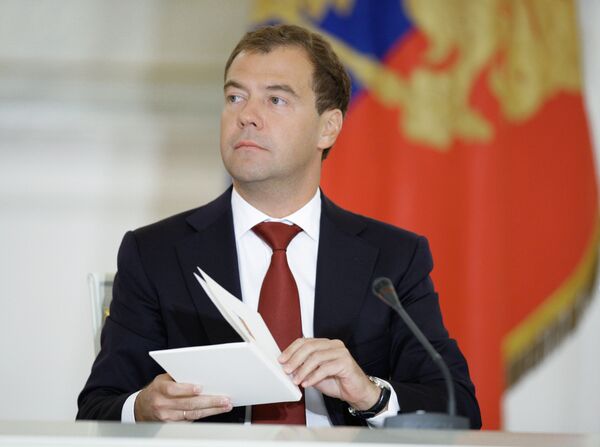A year ago President Dmitry Medvedev published his article "Forward, Russia!", in which he mapped out the trajectory of the country's development over the next few decades. He identified the priorities in the country's drive toward modernization and the main obstacles standing in the way.
Only 365 days have passed since the article was published, and clearly this is not enough time to achieve any fundamental changes. As Medvedev himself wrote, even "twenty years of turbulent change has not freed our country from its humiliating dependence on raw materials." One year is certainly not enough time to overcome "age-old backwardness" and "age-old corruption," which the president identified as the worst diseases afflicting state.
No one expected any miracles, and the problems and the goals remain the same. However, as the Chinese put it, "A journey of a thousand li begins with a single step." A year is certainly enough time to take at least one step.
On January 22, 2010, Medvedev held a special meeting of the State Council, whose focus is the political development of Russia. He invited the leaders of all parliamentary parties and all registered parties without seats in parliament. The Vesti-24 Channel broadcasted the event live, which was a major change in and of itself.
The president not only gave the floor to all party leaders, including from opposition parties, but criticized the current state of affairs himself: "The political system needs to be smarter, more flexible, more modern, but in practice, we all too often encounter an attempt to control increasingly complex social processes using primitive, and I would even say, stupid methods of administration."
There are grounds for reserved optimism regarding federal parliamentary elections in the future, all the more so now that the election legislation has been amended to make life easier for all political parties and to provide parties that fail to pass the seven-percent threshold in elections with more opportunities to participate in the legislative process.
Great strides have been made to humanize the criminal justice system - not by amending the Criminal Code but rather by making fundamental change in law-enforcement practice, which has often been inhuman and inquisitional. In extreme cases, suspects have even died in pre-trial detention centers although their guilt had yet to be proved. As long as they are alive, suspects at least have a chance of being acquitted.
As a result, there has been a revolution at the Federal Penitentiary Service. All top officials were fired. Populations in pre-trial detention centers have gradually begun to decline. Defendants are increasingly released on bail, and sentences for mothers convicted of minor offenses are being deferred until their children come of age. Judges had these rights before, but they did not exercise them too often.
Finally, Medvedev, himself a lawyer, took on the notorious "accusation trend" that has become a hallmark of our criminal justice system. These are some of the measures Medvedev promised to take to strengthen the judiciary in his article "Forward, Russia!"
In addition, for the first time the public in Russia could read income declarations of the heads of notoriously closed agencies like the Federal Guard Service, the Federal Security Service and the Foreign Intelligence Service, not to mention the Ministry of the Interior, whose employees have been subjected to scathing criticism.
In his article, Medvedev recognized the need for fundamental changes in this agency and promised to carry them out. The time has come to make good on these promises. The publication of the draft law, On the Police, for nationwide discussion is probably the most significant step towards modernization. This was an unprecedented move by the Russian government.
But passing this draft law is even more important. How will the law change before it is passed? To what extent will the results of public discussion be reflected in it? The answers to these questions will come shortly. For now it is clear that the president is moving forward with the initiatives he laid out in his article one year ago.
RIA Novosti political commentator Nikolai Troitsky
The opinions expressed in this article are the author's and do not necessarily represent those of RIA Novosti.



